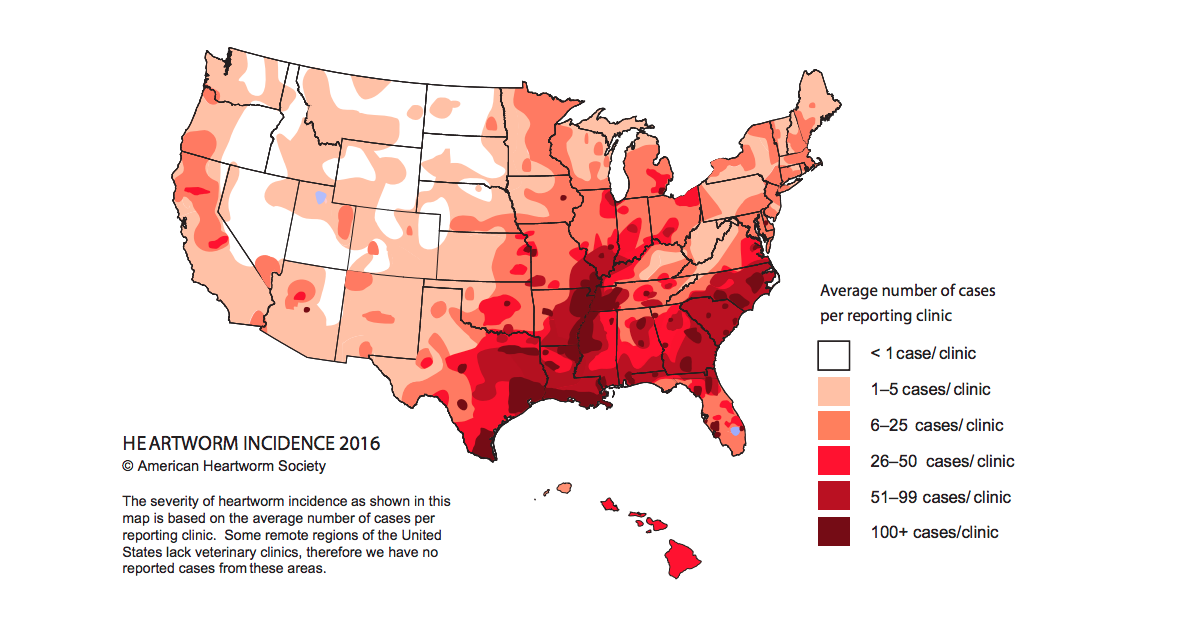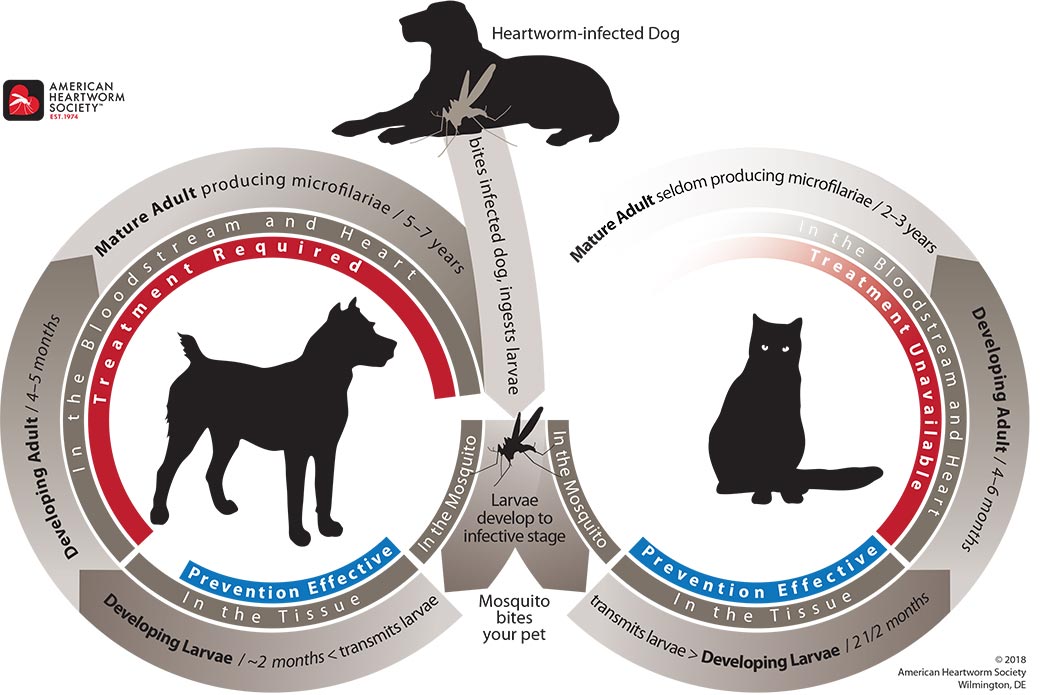
Heartworms
Heartworm disease is a life threatening illness that is seen commonly in the south, including North Carolina. This disease is spread through mosquitoes and can cause heart problems or sudden death in dogs and cats. It is important to protect your pet against this fatal disease by using veterinary formulated heartworm prevention year round and ensuring your pet is appropriately tested and protected.
Life cycle
Heartworm disease is transmitted through contact with mosquitoes. Heartworms are contagious to both cats and dogs and can cause serious disease. If your pet is bitten by an affected mosquito, the infected worm larvae are passed into their bloodstream where they can form into adult worms that can live in the heart and lungs. These worms can create serious disease in the heart and can lead to coughing, exercise intolerance, heart problems and even death.

Detection of Heartworm Disease
Heartworm testing your pet can help identify exposure or illness. After your pet is bitten by a mosquito, it can take 6 months for the worms to produce an immune response strong enough to be identified by the test. Heartworm testing in dogs is recommended annually if your pet is on regular heartworm prevention. If your pet has possibly been exposed to heartworm disease, your veterinarian may recommend re-testing them in 6 months to ensure they are not affected.
Heartworm disease detection in cats is not as straight forward. Cats do not typically show significant clinical signs of heartworm disease until the disease is severe and testing them for the disease is more complex. While dogs can carry a large worm load and still have mild-moderate clinical signs, it may only take one heartworm for a cat to show signs of illness. One of the most common clinical signs seen in cats with heartworm disease is sudden death. Therefore, it is crucial to ensure your cat is on appropriate heartworm prevention year round.
Treatment
Heartworm disease in dogs is typically treatable if caught early enough. Heartworm treatment is a several month long process that can be painful and expensive for your pet.Typically, your veterinarian will recommend performing tests such as blood tests and X-rays on your pup to assess their overall health and stage the extent of heartworm disease. A month long course of an oral medication is typically administered when starting treatment to help reduce the immune response of the worms. Additional medications may be administered depending on the severity of your dog’s disease. A 3 course set of deep injections into your pet’s back muscle is then given to kill the worms. These injections are performed over the course of about 4 weeks. During and after heartworm treatment, restricting your pet’s exercise is of the utmost importance to help prevent serious health complications such as stroke. Heartworm treatment may cost anywhere from $800-1200 or more depending on the weight of your pet. We recommend discussing each component of treatment with your veterinarian to identify what is best for your pet.
Heartworm prevention is crucial to prevent your pet from being exposed and avoiding the need to pursue treatment. If your pet is unfortunately diagnosed with heartworm disease, we recommend discussing treatment cost and plan with your veterinarian.
Prevention
Heartworm prevention is a prescription medication. This means that it must be legally prescribed by a veterinarian who has performed a physical exam and a heartworm test on your pet within the last year. There are many topical, oral, and injectable formulations (for dogs only) available for your pet to protect them. Most are administered monthly. The injectable formulations may protect your pet for 6, or even 12 months. Most heartworm prevention products are also available online or in online pharmacies. We do not recommend purchasing heartworm prevention from these places. It is safest to purchase heartworm prevention from a reliable source such as your veterinary office due to the risk of fraudulent or improperly stored products. The products provided by your veterinary office are guaranteed by the manufacturer and are directly provided and guaranteed to be stored safely as directed.
It is unclear where the products that are available for purchase online are distributed from or how they are stored. Some products are being shipped from overseas and may not be legal for use in the United States. If the product seems too good to be true, or does not require a prescription, we recommend using extreme caution if considering purchasing it for your pet.
Summary
Heartworms are a serious issue in North Carolina. It is essential to protect your pets from being exposed using appropriate heartworm preventatives. While treatment is available for dogs, it can be costly and can be painful for your pet. As of the time this post is written, there is not currently a standardized treatment protocol available for cats. Ensuring your pet is properly protected with appropriate heartworm prevention year round is the most financially reasonable and responsible way to help ensure your pet is safe from heartworm disease. For more information on heartworm disease and all topics discussed, please visit the American Heartworm Society’s website at www.heartwormsociety.org.
If you have any questions or concerns about your pet, the best heartworm prevention for your pet’s lifestyle, or heartworm treatment, please do not hesitate to contact us at 704-847-8466 or wah@wahcares.com.
